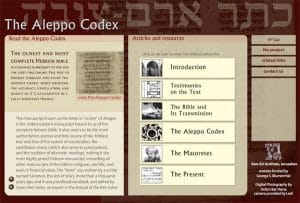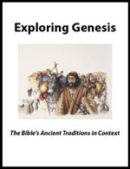The Aleppo Codex Online
“The Crown” of ancient biblical manuscripts joins the digital age
This Bible History Daily feature was originally published in 2013.—Ed.


Study the Aleppo Codex online. The Aleppo Codex has joined the ranks of other ancient biblical manuscripts that are available on the Internet. Credit: www.aleppocodex.org.
Throughout its long history, the Aleppo Codex has been carefully and jealously guarded. The Aleppo Codex online project, however, has placed the Aleppo Codex among the ranks of other ancient biblical manuscripts that have been made available to all via the web. Under the auspices of the Ben-Zvi Institute in Jerusalem and funding by George S. Blumenthal, the Aleppo Codex online—that is, at least the remnants of it that arrived in Jerusalem in 1957—is available free for anyone with a computer and an internet connection.
The project to put the Aleppo Codex online follows in the footsteps of several other plans that are aimed at making ancient biblical manuscripts accessible to all. Ancient biblical manuscripts such as the Dead Sea Scrolls, for example, are in the process of being digitized and made available to anyone who wishes to study them. Ancient biblical manuscripts—indeed, ancient manuscripts in general—are very fragile and must be handled as little as possible. Digitizing these precious artifacts not only makes them universally accessible, but also helps preserve them.


Visitors to the Aleppo Codex online can learn about the text’s unique features and read a detailed history of the Masoretic textual tradition. But the highlight of the site is, of course, the codex itself: visitors can search the entire extant text, chapter by chapter, verse by verse. A zoom function allows for close inspection of the text and of its extensive marginalia; it also affords readers a first-hand look at the damage that the codex has sustained.
The Aleppo Codex has seen many resting places in its 1,000 years. Only time will tell whether or not the internet will serve as a durable home. One thing is certain: Never have so many readers, both scholars and laypeople, had the opportunity to examine this precious document.
Visit the Aleppo Codex online at www.aleppocodex.org.
This Bible History Daily feature was originally published on November 1, 2013.
More on the Aleppo Codex in the BAS Library:
Yosef Ofer, “The Mystery of the Missing Pages of the Aleppo Codex,” Biblical Archaeology Review, July/August 2015.
Yosef Ofer, “The Shattered Crown,” Biblical Archaeology Review, September/October 2008.
Harvey Minkoff, “The Aleppo Codex,” Bible Review, August 1991.
Not a BAS Library member yet? Join the BAS Library today.
Dig deeper into biblical Archaeology with your All-Access Membership
The world of the Bible is knowable. We can learn about the society where the ancient Israelites, and later Jesus and the Apostles, lived through the modern discoveries that provide us clues.
Biblical Archaeology Review is the guide on that fascinating journey. Here is your ticket to join us as we discover more and more about the biblical world and its people.
Each issue of Biblical Archaeology Review features lavishly illustrated and easy-to-understand articles such as:
• Fascinating finds from the Hebrew Bible and New Testament periods
• The latest scholarship by the world’s greatest archaeologists and distinguished scholars
• Stunning color photographs, informative maps, and diagrams
• BAR’s unique departments such as First Person and Strata
• Reviews of the latest books on biblical archaeology
The BAS Digital Library includes:
• 45+ years of Biblical Archaeology Review
• 20+ years of Bible Review online, providing critical interpretations of biblical texts
• 8 years of Archaeology Odyssey online, exploring the ancient roots of the Western world in a scholarly and entertaining way,
• The New Encyclopedia of Archaeological Excavations in the Holy Land
• Video lectures from world-renowned experts.
• Full online access to 50+ curated Special Collections,
• Four highly acclaimed books, published in conjunction with the Smithsonian Institution: Aspects of Monotheism, Feminist Approaches to the Bible, The Rise of Ancient Israel and The Search for Jesus.
The All-Access membership pass is the way to get to know the Bible through biblical archaeology.

